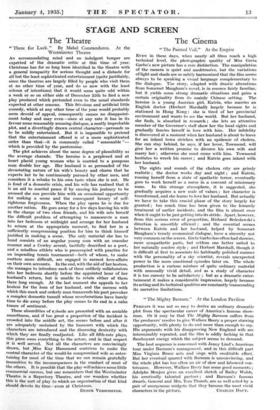STAGE AND SCREEN The Theatre
" Three for Luck." By Mabel Constanduros. At the Westminster Theatre AN accommodating mind and an indulgent temper are expected of the dramatic critic at this time of year. Christmas has for so long been identified in the theatre with a general incapacity for serious thought and a distaste for all but the least sophisticated entertainment (quite justifiably, since the theatres are largely filled by people who visit them at no other time of year, and do so now with the least solemn of intentions) that it would seem quite odd within a week or so on either side of December 25th to find a new play produced which pretended even to the usual standards expected at other seasons. This frivolous and artificial little comedy, which at any other time of the year would probably seem devoid of appeal, consequently causes no disappoint- ment today and may even—since at any rate it has in its favour some reasonably amusing dialogue, a neatly improbable plot, and a divertingly drawn central character—persuade us to be mildly entertained. But it is impossible to pretend that the entertainment offered is of a more sophisticated order than that—it is commonly called " seasonable "- which is provided by the pantomime.
The plot achieves about the same degree of plausibility as the average charade. The heroine is a perplexed and at heart placid young woman who is married to a pompous man double her age. Her husband is so persuaded of the devastating nature of his wife's beauty and charm that he expects her to be continuously pursued by other men, and considers it a rebuke to his own taste when she is not. He is fond of a domestic crisis, and his wife has realized that it is an aid to marital peace if by causing his jealousy to be aroused she can provide him with an occasional opportunity for making a scene and the consequent luxury of self- righteous forgiveness. When the play opens he is due for another ration. He goes away for a few days leaving his wife in the charge of two close friends, and his wife sets herself the difficult problem of attempting to manoeuvre a man into her bedroom at midnight and arrange for her husband to return at the appropriate moment, to find her in a sufficiently compromising position for him to think himself justified in making a scene. The only material she has to hand consists of an angular young man with an oracular manner and a Cowley accent, tactfully described as a poet, and a mindless athlete who is preoccupied with practice for an impending tennis tournament—both of whom, to make matters more difficult, are engaged in earnest love-affairs on their own accounts. In the end, with the aid of her hostess, she manages to introduce each of these unlikely collaborators into her bedroom shortly before the appointed hour of her
husband's return, but is unable to retain either of them there long enough. At the last moment she appeals to her hostes:s for the loan of her husband, and the success with which this meek and orderly man transcends his part provokes a complex' domestic tumult whose reverberations have barely time to die away before the play comes to its end in a calm trance of sentiment. • These absurdities of episode are presented with an amiable
smoothness, and if too great a proportion of the incident is crowded• into the middle act, the scenes before and after it are adequately sustained by the humours with which the characters are introduced and the disarming dexterity with which they are finally readjusted. Like all fifth-rate plays, this piece owes everything to the actors, and in that respect it is well served. Not all the characters are convincingly 'drawn, but Miss Kay Hammond contrives to make the central characterof the would-be compromised wife so enter- taining for most of the time that we can remain gratefully insensitive to the inconsequences in the conduct of most of the others. It is possible that the play will achieve some little commercial success, but one remembers that the Westminster Theatre is a Repertory Theatre, and one wonders whether this is the sort of play to which an organization of that kind should devote its time—even at Christmas.
Dsairc • VERSCHOYLE.






































 Previous page
Previous page